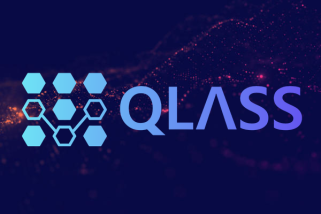
Quantum Technology training for policymakers - 3rd training series
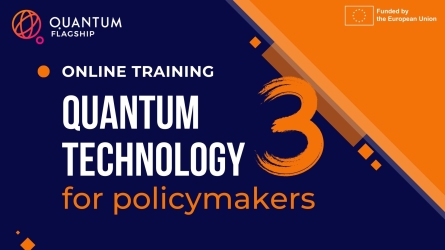
The Quantum Flagship is offering a series of training sessions on Quantum Technology (QT), addressing policymakers at EU and national levels. The training has been designed in collaboration with EC policymakers accounting for their interests and needs.
The second training series consist of three online sessions, each 60 minutes long with 30 minutes of presentations from experts and a 30-minute Q&A session. The sessions will be recorded and be made available on this page.
The training sessions will cover:
Click on the links below to be directed to the sessions and find more information.
- Standardisation roadmap in the context of the Quantum Europe Strategy (October 2025)
- Quantum sensing: from the human eye to planet earth (November 2025)
- Developing the roadmap to implement the Quantum Europe Strategy (December 2025)
- Quantum technologies for law enforcement (February 2026)
More sessions will be announced soon.
Contacts persons:
Oxana Mishina (CNR-INO) oxana.mishina@ino.cnr.it
Costanza Toninelli (CNR-INO) costanza.toninelli@ino.cnr.it

About the moderator:
Dr. Oxana Mishina obtained her PhD in physics from St. Petersburg Polytechnic University. She conducted quantum experiment simulations at both the Niels Bohr Institute and the Kastler-Brossel Laboratory. Her contributions also extend to developing a theory for cooling and squeezing atoms at Saarland University. In her role as a physics education researcher at TU Braunschweig, she engaged in collaborative work with the University of Trieste, focusing on in-service teacher training in the field of quantum physics.
Oxana works as the Italian National Institute of Optics of the National Research Council CNR-INO within the Coordination and Support Action of the European Quantum Flagship. She contributes to the areas of education and equity, diversity and inclusion (EDI) in the European Quantum Technology community by creating and coordinating the QTEdu.eu community (>400 members), organising the Quantum Technology training for policymakers, coordinating the Equity&Inclusion working group at QTEdu.eu (>100 members) and being a member of the EDI WG since 2018. Oxana is also an experienced science communicator, having been a Quantum Ambassador in schools since 2015 and having organised and participated in numerous outreach events in France, Germany and Italy, such as the Italian Quantum Weeks, which developed 20 Italian cities.
1st session: Standardisation roadmap in the context of the Quantum Europe Strategy
with Dr. Oskar van Deventer, senior scientist at Netherlands Organisation for Applied Scientific Research TNO (Netherlands)
and Dr. Homer Papadopoulos, Research Director of Applied Science in the National Centre for Scientific Research NCSR “Demokritos”, co-founder of Syndesis Ltd (Greece)
moderated by Dr. Oxana Mishina, Quantum Physicist at National Institute of Optics CNR-INO (Italy)
2 October 2025
11:00 CET - 12 :00 CET
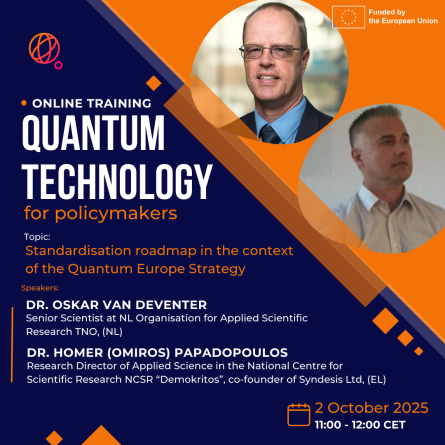
Agenda
- Welcome by Dr. Oxana Mishina
- Actions of the European Committee for Standardisation by Dr. Oskar van Deventer
- Contribution from the Quantum Industry Consortium by Dr. Homer Papadopoulus
- Q&A session
About the speakers:
Dr. M. Oskar van Deventer is a senior scientist at TNO and the European leader in the standardisation of quantum technologies. He has chaired the CEN-CENELEC JTC22 Committee on Quantum Technologies since 2020. He has several decades of experience in developing standards across numerous Standards Developing Organisations (ETSI, ITU, MPEG, DVB, HbbTV, etc.). He is the author of one book, more than 250 publications, over 90 patent applications, over 1,000 standardisation contributions and several international standards. He also edited the 100-co-author European Standardisation Roadmap for Quantum Technologies.
Oskar has more than 37 years’ experience in the field of communications and information technologies. He obtained his PhD in bidirectional optical transmission in 1994 at Eindhoven University of Technology. From 1987 to 1998 he worked at KPN Research on optical communication in a wide range of European projects. From 1998 to 2007 he was a senior scientist in voice networking at TNO. In 2007 he moved to media networking, discovering many commonalities with his previous work. In 2014 he shifted to blockchain networking and self-sovereign identity, again finding surprising overlaps with his networking expertise. In 2020 he also became active in the standardisation of quantum technologies.
Dr. Homer (Omiros) Papadopoulos is a Research Director at NCSR Demokritos and co-founder of Syndesis Ltd. He holds a degree in Physics and a Pre-PhD in Telecommunications from the University of Athens, an MBA from Warwick University, and a PhD from the IS/IT Department of the University of Bath, UK. He is an experienced researcher and development manager with a proven track record in AI, cybersecurity, mobile services and telecommunication networks, and has more than 20 years’ experience in creating multidisciplinary research programmes.
Based in Athens, he is a partner in the Greek QCI network (HellasQCI), where he leads WP6 and T3.4 on Standards, and serves as a mandated expert in CEN-CENELEC JTC22 on Quantum Technologies and ISO/IEC JTC3 for Greece. He also chairs the Standards Working Group for the European Quantum Industry Consortium and participates in both the High-Level Forum on European Standardisation and the European Multi-Stakeholder Platform on ICT Standardisation.
Dr. Papadopoulos has successfully coordinated EU-funded projects and has published numerous papers in journals and at international conferences.
2nd session: Quantum Sensing: from the human eye to planet earth
with Dr. Patrick Bowen Montague, R&D Manager at NKT Photonics (Denmark)
and Dr. Jean Lautier-Gaud, project manager at LTE, Observatoire de Paris, CNRS (France)
moderated by Dr. Oxana Mishina, Quantum Physicist at National Institute of Optics CNR-INO (Italy)
6 November 2025
11:00 CET - 12 :00 CET
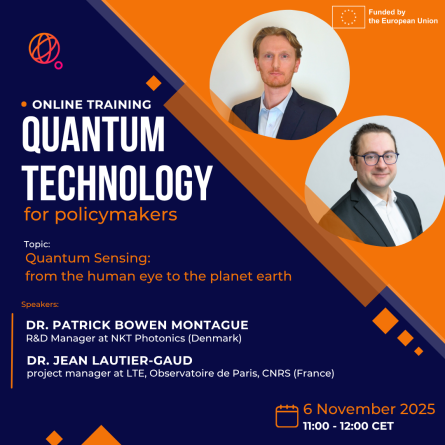
Agenda
- Welcome by Dr. Oxana Mishina
- Quantum Optical Coherence Tomography for retinal imaging by Dr. Patrick Bowen Montague
- Quantum gravity network for earth monitoring by Dr. Jean Lautier-Gaud
- Q&A session
About the speakers:
Dr. Patrick Montague is Head of the Future Technologies Department at NKT Photonics, where he is responsible for scoping and assessing the feasibility of new laser systems, as well as expanding engagement in emerging markets to grow the NKTP product portfolio. He has been with NKTP since 2017, working for several years in Engineering roles developing novel laser systems.
He studied at the University of Auckland, where he gained a PhD in Physics and an undergraduate degree in Optoelectronics.
In relation to quantum technologies, NKTP has been instrumental in supplying single-frequency lasers for trapped atom physics, squeezed light, and photonic quantum computing. Dr Montague’s department plays a leading role in developing early prototypes of these lasers and identifying new development opportunities.
Dr. Jean Lautier-Gaud holds a PhD in Quantum Sensing from Sorbonne University and Paris Observatory, as well as an MBA from Collège des Ingénieurs. For eight years, he was Head of Business Development and Sales at the start-up Muquans, which specialised in quantum gravimeters. Muquans was successfully acquired and became Exail Quantum Systems.
Dr. Lautier-Gaud then co-founded the start-up Welinq, pioneering the interconnection of quantum processors. He now serves as Project Manager of EQUIP-G – the European QUantum Infrastructure Project for Gravimetry.
3rd session: Developing the roadmap to implement the Quantum Europe Strategy
with Dr. Eleni Diamanti, Research Director at CNRS, Sorbonne University (France)
and Dr. Salvatore Cinà, Program Director at CEA (France)
moderated by Dr. Oxana Mishina, Quantum Physicist at National Institute of Optics CNR-INO (Italy)
11 December 2025
11:00 CET - 12 :00 CET

Agenda
- Welcome by Dr. Oxana Mishina
- Presentation by Dr. Eleni Diamanti
- Presentation by Dr. Salvatore Cinà
- Q&A session
About the speakers:
Dr. Eleni Diamanti is CNRS research director at the LIP6 laboratory of Sorbonne University in Paris. She received her PhD in Electrical Engineering from Stanford University in 2006 and was a Marie Curie postdoctoral fellow at the Institute of Optics Graduate School in Palaiseau before joining the CNRS in 2009. Her research focuses on experimental quantum cryptography and communication, and on the development of photonic resources and applications for quantum networks. She is a recipient of a European Research Council Starting Grant, director of the Paris Centre for Quantum Technologies, and was awarded the CNRS Silver and Innovation Medals in 2024. She also serves as vice chair of the European Quantum Technologies Flagship Strategic Advisory Board and is cofounder and scientific advisor of the start-up company Welinq that specializes in quantum interconnect technology.
Dr. Salvatore Cinà is the Program Director for Quantum Technologies at CEA. He was previously responsible for technology transfer and for establishing and managing strategic industrial partnerships. Earlier in his career, he served as the Deputy Head of the Optoelectronic Department at CEA-LETI, as well as the Executive Director of the III-V Lab, a joint venture between CEA, Thales, and Nokia. As a scientist, he conducted research at the University of Cambridge on poly-Si thin-film transistors, at the Toshiba Cambridge Research Centre on III-V semiconductor devices, at Cambridge Display Technology on organic-based optoelectronic devices, and at Thomson on the development of OLED-based displays. Salvatore has a degree in Physics from the University of Rome, and a PhD in Semiconductor Physics from the University of Cambridge.
4th session: Quantum Technologies for Law Enforcement
with Dr. Iwen Coisel, digital forensic examiner at EUROPOL (Netherlands)
and Dr. Michal Krelina, CTO and founder of QuDEF (Netherlands)
moderated by Dr. Oxana Mishina, Quantum Physicist at National Institute of Optics CNR-INO (Italy)
05 February 2026
11:00 CET - 12 :00 CET
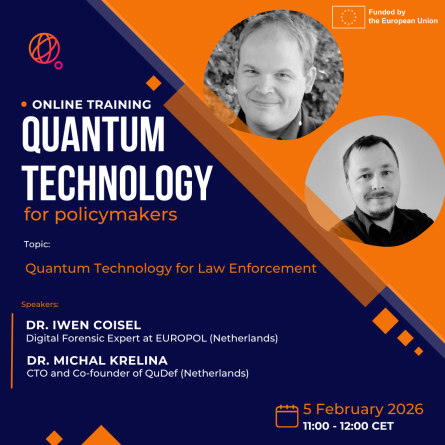
Agenda
- Welcome by Dr. Oxana Mishina
- Overview of Quantum Technology use in law enforcement by Dr. Iwen Coisel
- Quantum Sensing for law enforcement by Dr. Michal Krelina
- Q&A session
About the speakers:
Dr. Iwen Coisel has been a digital forensic examiner at the European Cybercrime Centre (EC3) at Europol since May 2021, where he focuses on the decryption of digital evidence in operational investigations.
He received his Ph.D. in cryptography from Orange Labs (France) in 2009 and previously held research positions at the Université catholique de Louvain (Belgium) and the Joint Research Centre of the European Commission in Ispra (Italy). His work spans cryptography, cybersecurity, digital forensics, password cracking techniques, and password strength metrics.
More recently, his work has turned toward the implications of quantum technologies for law enforcement, exploring both the cryptographic threats posed by quantum computing and the opportunities it may create for future digital investigations.
Dr. Michal Krelina, as a consultant, analyst, and researcher, focuses on the security and defence applications of quantum technology. Dr. Krelina is a Co-Founder and CTO at QuDef, a quantum security company, and an Associate Senior Researcher at SIPRI Armament and Disarmament, specialising in quantum technology. In addition, he is a member of the Strategic Advisory Board of the Quantum Technology at the European Commission. His professional interests span mapping quantum technology military applications, exploring its roles in future conflicts, developing quantum countermeasures, assessing quantum technology risk and threats, examining the convergence of quantum and classical cybersecurity, and studying the impact of quantum technology on international security and peace research. He has also provided consulting services to organisations such as NATO SACT, NATO JAPCC, and EUSPA, as well as various defence, law enforcement, and governmental agencies. He holds a PhD in experimental nuclear physics.

